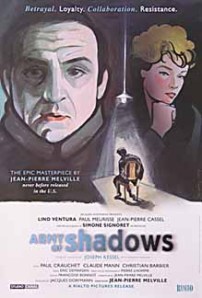 The French film L’Armée des Ombres (“Army of Shadows”) is an adaptation of the 1943 book (same title) by Joseph Kessel, who participated in the French Resistance. Whether you know little or much about the Resistance, if you want a realistic film portrayal of a critical aspect of the Second World War, this is a film to rent or buy. I can’t imagine a more effective vehicle for presenting an insider’s view of the movement.
The French film L’Armée des Ombres (“Army of Shadows”) is an adaptation of the 1943 book (same title) by Joseph Kessel, who participated in the French Resistance. Whether you know little or much about the Resistance, if you want a realistic film portrayal of a critical aspect of the Second World War, this is a film to rent or buy. I can’t imagine a more effective vehicle for presenting an insider’s view of the movement.
The film is expertly cast and paced with precision. But the action is subdued, so don’t expect a Jason-Bourne-meets-James-Bond kind of experience. Army of Shadows offers a tight shot of espionage—plotting with limited resources, the paltry odds of success, endless psychological misgivings, and complex interpersonal dynamics.
The movie is filled with tension. But it’s the kind of tension that invites serious consideration of difficult questions:
- What does it really mean to be courageous?
- Is it possible to exercise genuine freedom of self-determination in the very moment you are about to be executed by a firing squad?
- Can a cause be so just that killing an innocent co-belligerent is justified if letting her live could compromise the mission?
- On what basis can you entrust your life to someone you’ve never met?
- Should a woman with the skills needed to execute a tactically sophisticated and personally dangerous mission be enlisted if she has a husband and children who know nothing of her activities?
- Does it ever make sense to engage in a fatal rescue operation if no one will know of your valor?
- Why does the simple offer of a cigarette enable some men to face certain death with dignity?
- Was the French Resistance a prudent response to the Nazi occupation of France?
This film churns the emotions and the mind. The Resistance is testimony to the indomitable spirit of human beings guided by commitment to a high ideal. I saw Army of Shadows soon after seeing the Angelina Jolie film Changling. The similarities are unmistakable. Both are based on actual events. In both cases individuals pursuing righteous causes suffer terrible indignities. In both, success seems humanly impossible. Hope wells up from a secret place and keeps men and women in the game, even when the game is almost certainly lost. These are remarkable parallels, parallels I would have missed if I had not seen the two films in the same week.
As these films end and the credits roll, some viewers will be stuck to their seats with feelings of sadness mixed with cheer. The sadness explains itself. The cheer is unexpected. But the cheer is solidly grounded. It rises in response to the failed heroism of Christine Collins, the mother in Changling, and of Phillipe Gerbier, the head of a Resistance network in L’Armée des Ombres. Because the heroism is real, though it is not rewarded with complete success (or perhaps because it is not rewarded with complete success), our own dignity is affirmed.
I’m ususally content to see a movie once, even a very good movie. But soon I’ll be downloading L’Armée des Ombres from Amazon to my TiVo. This one is worth owning and re-viewing.

Amazon DVD

Amazon Video on Demand

The Book by Joseph Kessel



 What do you think of Father Flynn’s description of gossip and his method of illustrating this vice? Is it effective? Does it give you greater insight into the nature of this common but malicious practice? Have you ever been the victim of gossip? Did it have an unfair effect on your reputation? How did you respond? Did you do something about it? What should a person do when someone with influence has spread rumors about him or her to others?
What do you think of Father Flynn’s description of gossip and his method of illustrating this vice? Is it effective? Does it give you greater insight into the nature of this common but malicious practice? Have you ever been the victim of gossip? Did it have an unfair effect on your reputation? How did you respond? Did you do something about it? What should a person do when someone with influence has spread rumors about him or her to others? List other films you’ve seen starring Meryl Streep in a lead role. Compare Streep’s performance in Doubt with her performance in these other films. On a scale of 1 to 100, how would you rate her performance in Doubt in comparison with her performance in other films? Alternatively, rank her performance in this and other films by placing them in order, starting with the best and working down the scale.
List other films you’ve seen starring Meryl Streep in a lead role. Compare Streep’s performance in Doubt with her performance in these other films. On a scale of 1 to 100, how would you rate her performance in Doubt in comparison with her performance in other films? Alternatively, rank her performance in this and other films by placing them in order, starting with the best and working down the scale.







Recent Comments